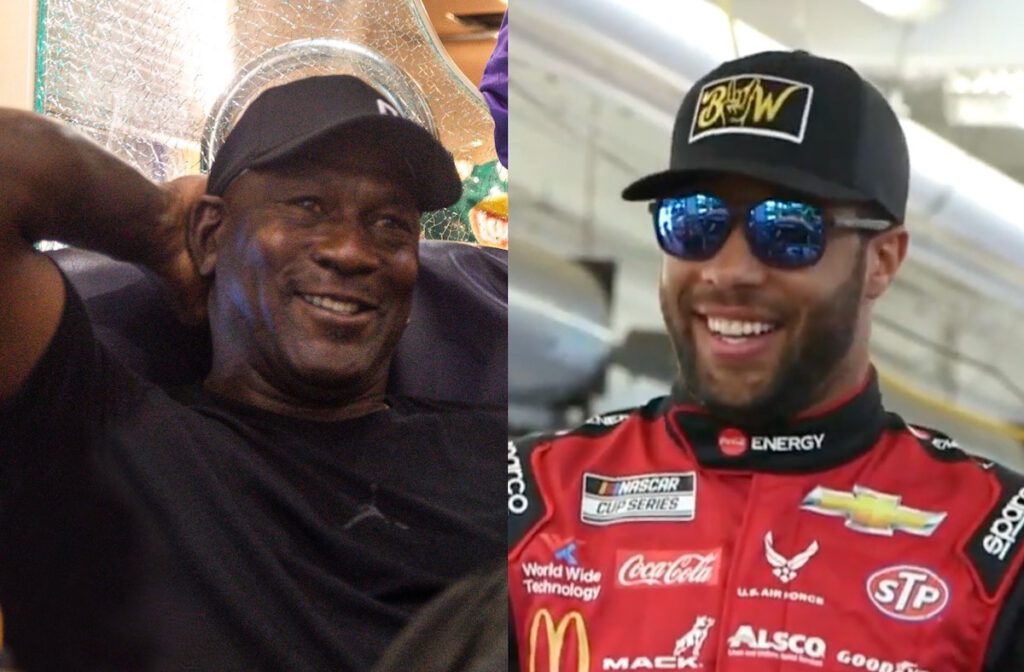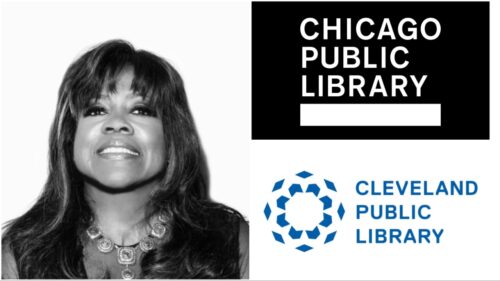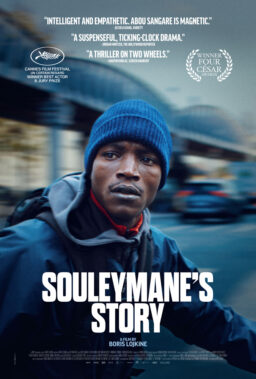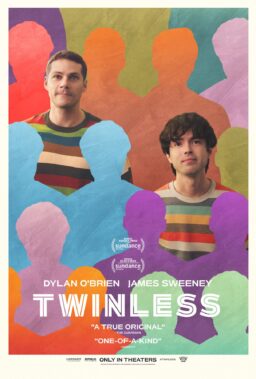After Bubba Wallace, the only full-time African American driver in NASCAR, made history by persuading the auto-racing company to outlaw the display of the confederate flag, he makes history again by becoming the first driver for NBA legend Michael Jordan‘s first Black majority-owned racecar team. Jordan has joined with NASCAR icon Denny Hamlin to form the single car NASCAR Cup Series team, which is aiming to compete next year.
“This is a unique, once-in-a-lifetime opportunity that I believe is a great fit for me at this point in my career,” Wallace posted on Instagram. “Michael and Denny are both great competitors and are focused on building the best team they possibly can to go out and compete for race wins. I’m grateful and humbled that they believe in me and I’m super pumped to begin this adventure with them.”
Never would I have ever thought that in my lifetime I would see the Confederate Flag being banned at all NASCAR races and events. Yet that is precisely what happened on June 10th of this year, two days after Bubba Wallace called for its removal.
“The presence of the confederate flag at NASCAR events runs contrary to our commitment to providing a welcoming and inclusive environment for all fans, our competitors and our industry,” the company said in a statement. “Bringing people together around a love for racing and the community that it creates is what makes our fans and sport special. The display of the confederate flag will be prohibited from all NASCAR events and properties.”
I was so moved to see Wallace unveil his new car displaying the words, “Black Lives Matter,” while surrounded by his fellow racers who stood with him and drove alongside him in solidarity. It is instances such as these where humankind comes together that gives me hope. At a time of such profound distress, it is so great to see some progress.
“There is a poster of a little girl that says, yes we said Black Lives Matter, no we did not say only Black Lives Matter,” Wallace said during a June media conference. “We know that all lives matter, but we are trying to make you all understand that Black Lives Matter, too. Too. T-o-o. It’s three letters that is left off that people don’t understand. Black Lives Matter, too. Families are worried about their kids going out and driving for the first time and getting pulled over and being killed. The African American community is so worried about that right now. We shouldn’t live like that. The African American community should not live like that. We’re trying to get other people to understand just how tough it is to live in this world right now.”
The fact that Wallace didn’t make NASCAR’s All-Star qualifier back in July won’t matter, since his story has already won the year. On September 10th, Wallace announced that he will be stepping down from the 43 car he drove during this historic season once he completes the nine races left for this year. In a statement, Wallace thanked Richard Petty Motorsports for the opportunity to start his Cup Series career, but stopped short of providing the reason for his decision. He will always be remembered, along with Colin Kaepernick, for taking a stand (or a knee) for what is right. It was not an easy decision for Wallace to take a stand and he wondered what kind of trouble would result from it. But just as Dr. Martin Luther King, Jr. said, “The time is always right to do what is right.” And as the late Congressman John Lewis would say, Wallace’s actions constituted “good trouble.”

Michael Jordan’s ownership of a team with a Black racecar driver is also historic. “Growing up in North Carolina, my parents would take my brothers, sisters and me to races, and I’ve been a NASCAR fan my whole life,” Jordan said. “The opportunity to own my own racing team in partnership with my friend, Denny Hamlin, and to have Bubba Wallace driving for us, is very exciting for me. […] In addition to the recent commitment and donations I have made to combat systemic racism, I see this as a chance to educate a new audience and open more opportunities for Black people in racing.”
NASCAR’s banning of the confederate flag touched home for me. I have never attended a NASCAR race, but at one time I was interested considering how I used to race cars in my youth. Yes, I said that. I didn’t compete on an official track. My racing took place on dirt tracks off cornfields in an unofficial Powder Puff Derby (that’s what they called the women’s races) in towns in Iowa. I was encouraged by my first husband, Merle Smith, who loved cars and even taught me to look under the hood and repair them.
My former husband also loved to race cars. We went to minor races at local racetracks around the country, and even attended a Formula One race in Hong Kong. He always felt at home at these speedways even though he was African-American. I, admittedly, felt less so. There were almost no other Black drivers or audience members around, and the atmosphere felt fraught with racial tension to me. I recall the stares and cold shoulders we sometimes encountered. But Merle just drove ahead, his passion for cars and racing outpacing his dread of racial resentments.
When he proved his prowess on the track, I saw his fellow drivers give him respect, sometimes grudgingly, sometimes happily. I was reminded of our adventures when I watched Bubba Wallace walk down the speedway with his fellow racers. This happened after Wallace found a noose in his garage at the track that prompted an FBI investigation. The investigation’s conclusion was that the noose wasn’t meant as a threat to Wallace, but his NASCAR colleagues wanted to show their solidarity with him against what had been perceived as a racist statement. He said he felt at one with his fellow drivers.
And more pervasive at NASCAR events were the confederate flags, which Wallace and many others felt were a symbol of racial divide. Following the death of George Floyd, he was motivated to speak up about racial inequity. He wanted to help define the issue within his NASCAR family community in the hopes of helping to heal it.
Wallace’s story is merely one example of how confederate symbols have been toppled across the country in recent months, and for good reason. In a statement published on July 12th by CBS News, Mark Roosevelt explained why he supports the removal of a statue displaying his great-grandfather, Theodore Roosevelt in front of New York’s Museum of Natural History. He called these confederate symbols a form of “racial taunting.”

“The subjugation of other races by those of us of European origin is our nation’s original sin,” Roosevelt wrote. “That sin began soon after our arrival on this continent, was written into our founding documents, and has been a tragic part of our history to this day. Recognition of that history and its many monstrous cruelties is essential to moving our nation forward and to healing so many wounds. If we wish to live in harmony and equality with people of other races, we should not maintain paternalistic statues that depict Native Americans and African Americans in subordinate roles. […] Even more clearly, we should certainly not maintain monuments that memorialize individuals who fought to keep in slavery the same people with whom we now say we wish to live in harmony and equality.”
It is my hope that the brave stand taken by Bubba Wallace, and NASCAR’s corrective and immediate response to it, and the entry of Michael Jordan into the world of NASCAR racing, will help us in some small measure “get on with the desperately needed work of uprooting systemic racism wherever it is found,” as Roosevelt advocates.
And Mike, by the way, you made a movie called “Space Jam,” how about a live-action animation about racing called “Race Jam.” You have Spike Lee’s number, I bet he would take your call.












